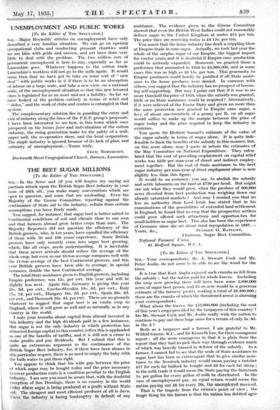THE BEET SUGAR MILLIONS
[To the Editor of THE SPECTATOR.]
Sia,—In the fierce and (if you will forgive my saying so) partisan attack upon the British Sugar Beet industry in your issue of 26th ult., you make many asseverations which are open to question, and some that are misleading. Even the Majority of the Greene Committee, reporting against the continuance of State aid to the industry, refrain from certain assumptions you have freely made.
You suggest, for instance, that sugar beet is better suited to Continental conditions of soil and climate than to our own and that farmers abroad grow better crops than ours. The Majority Reporters did not question the efficiency of the British growers, who, in ten years, have equalled the efficiency of those with 50 and 100 years' experience. Some British growers have only recently come into sugar beet growing, which, like all crops, needs understanding. - It is inevitable that these newer arrivals should reduce the average of the whole crop, but even so our 10-ton average compares well with the 11-ton average of the best Continental growers, and this year British growers have been able to, average, in special instances, double the best Continental average.
The total State assistance given to English growers, including Empire preference, was 12s. per cwt. this year and will be slightly less next. Again this, Germany is giving this year 21s. • 9d. per cwt., Czecho-Slovakia 18a, 0d. per cwt., Italy 17s. 7d. per evil., Hungary 16s. 5d. per cwt., Spain 20s. 2d. per cwt., and Denmark 10s. 4d. per cwt. There are no grounds whatever to suggest that sugar beet is an exotic crop to England, where it will grow as well and as naturally as in any country in the world.
I note your remarks about capital from abroad invested in this industry and the high dividends paid in a few instances. But sugar is not the only industry in which protection has attracted foreign capital to this country (often this is applauded as one of the benefits of tariffs), and it is still not a crime to make profits and pay dividends. But I submit that this is quite on extraneous argument to the continuance of the British Sugar Beet industry, for, if there have been abuses in this particular respect, there is no need to empty the baby with the bath water to put them right. You appear to think that the wide gap between the price at ,which sugar. May be bought today and the price necessary to cover production costs is a condition peculiar to the English industry. I am sate you must be aware that, with the doubtful exception of San Domingo, there is no country in the world today where sugar is being produced at a profit without State • aid. The cheapest and most efficient producer of all is Java. There the industry is facing bankruptcy in default of any assistance. The evidence given to the Greene Committee showed that even the British West Indies could not reasonably deliver sugar to the United Kingdom at under £12 per ton. The price they are receiving today is £4 15s. per ton.
You assert that the home industry has dealt a crippling blow at Empire trade in cane sugar. Actually, we took last year the whole of the surplus sugar of our Empire, the biggest import for twelve years, and it is doubtful if Empire cane production could be seriously expanded. Moreover, we granted them a preference that amounted in 1934 to 24,866,300, and in some cases this was as high as £6 14s. per ton. This generosity to Empire producers could hardly be justified if all State assist- ance to the home producer were denied. In common with others, you suggest that the industry has no prospect of becom- ing self-supporting. But may I point out that if it rose to no more than half the price of 1924, when the subsidy was granted, little or no State assistance would be. required ? Alternatively, if it were relieved of the Excise Duty and given no more than the same protection now granted to Empire cane sugar, a levy of about one-twentieth of a penny per lb. on all sugar would suffice to make up the margin between the price of sugar today and the price required to keep the industry in existence.
You quote Sir Herbert Samuel's estimate of the value of the sugar subsidy in terms of wages alone. It is quite inde- fensible to limit the benefits of the subsidy in this manner, but. on this score alone, may I quote in return the estimates of the May Committee on National Expenditure. They ealeu: lated that the cost of providing employment on capital relief works was £250 per man-year of direct and indirect employ- ment together. But the cost of State assistance to the beet sugar industry per man-year of direct employment alone is now
slightly less than this figure. .
It would be an economy, you say, to abolish the subsidy and settle labourers on the land at £750 per head. But might one ask what they would grow, when the produce of 400,000. acres diverted from beet production was weighing down our already saturated markets ? And may I remind you that no less an authority than Lord Ernie has_ stated that in . his examinations of the possibilities of extended land settlement in England, he found that no crop that the prospectiye settlers could grow offered such attractions and opportunities for small-holders as sugar beet. This also has been the experience of Germany since she set about rural repopulation in 1887.
. •
Chairman, Sugar Beet Committee.
National Farmers' Union, 45 Bedford Square, B.C." 1.










































 Previous page
Previous page